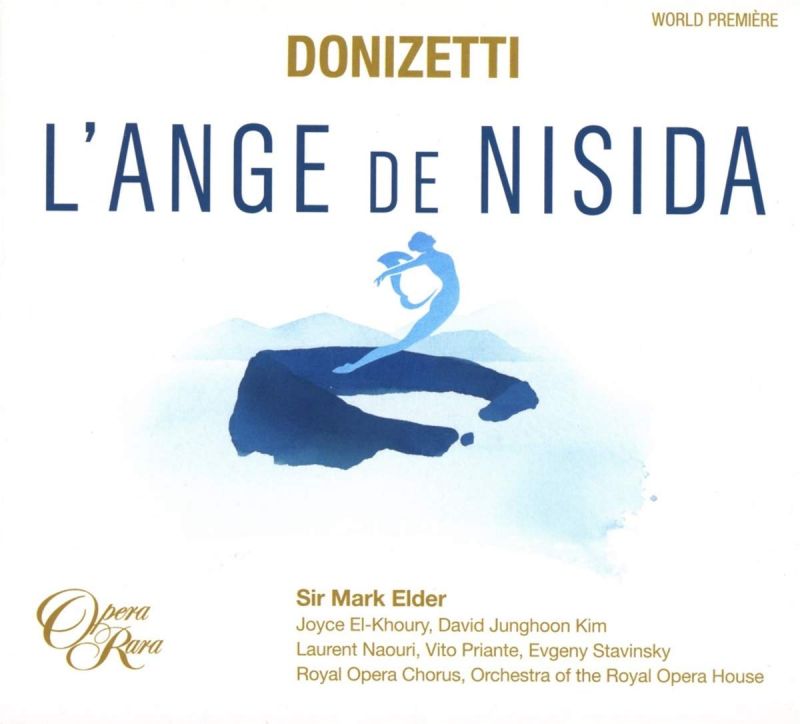DONIZETTI L'Ange de Nisida (Elder)
View record and artist detailsRecord and Artist Details
Composer or Director: Gaetano Donizetti
Genre:
Opera
Label: Opera Rara
Magazine Review Date: 06/2019
Media Format: CD or Download
Media Runtime: 157
Mastering:
DDD
Catalogue Number: ORC58

Tracks:
| Composition | Artist Credit |
|---|---|
| L'Ange de Nisida |
Gaetano Donizetti, Composer
David Kim, Leone de Casaldi, Tenor Evgeny Stravinsky, Monk; Father Superior, Bass Gaetano Donizetti, Composer Joyce El-Khoury, Countess Sylvia de Linares, Soprano Laurent Naouri, Don Gaspar, Bass-baritone Mark Elder, Conductor Royal Opera House Chorus, Covent Garden Royal Opera House Orchestra, Covent Garden Vito Priante, Den Fernand d'Aragon, Baritone |
Author: Richard Lawrence
Leone is mutually in love with Sylvia (the angel of the title), not knowing that she is the unwilling mistress of Don Fernand, the King of Naples. To placate the Church, the king agrees that Sylvia should be married off, the husband to be rewarded and packed off abroad without her. Leone is deputed to escort her to Rome; the situation unravels when Leone enthusiastically offers to be not merely the escort but the husband. Sylvia is appalled by what she takes to be Leone’s mercenary behaviour; Leone is equally appalled when he discovers the truth about Sylvia and the king. He retires to a monastery; Sylvia, now aware that his love was true, seeks him out but dies as they are reconciled.
There’s a faint anticipation here of the ending to La forza del destino. Donizetti’s plot is more credible than Verdi’s, just about, though ‘drained of my strength by sorrow’ does not seem sufficient reason for Sylvia’s death. What makes the opera unusual are the shafts of comedy. Don Gaspar, the king’s chamberlain, is a buffo bass: his patter song, ‘Et vous Mesdames’, turns up as ‘Un foco insolito’ in Don Pasquale (1843), and at one point he amusingly fears the fate that befell Peter Abelard. The king is an interesting figure who genuinely loves Sylvia and is devastated at the thought of losing her.
Mark Elder conducts this attractive score with love. There’s an irresistible bounce to the lighter passages and he provides sensitive, understated support for the characters’ emotional outpourings, with some beautiful playing from the horns. Laurent Naouri characterises Don Gaspar very well, despite not being in best voice. There is no aria for the king, but Vito Priante’s forthright delivery of ‘Ô mon ange que j’implore’ in the Act 2 finale is surely an indication of future greatness as a Verdi baritone. David Junghoon Kim, accomplished throughout, is particularly fine in the introspective ‘Hélas! Envolez-vous, beaux songes!’; it’s followed by a beautifully shaped phrase in the bassoons and lower strings. Joyce El Khoury is quite wonderful, with a virtuoso account of her Act 3 aria, from the regret of ‘Frais ombrage’ to the inappropriately skittish cabaletta which the editors have adapted from an addition for Paris to the score of Maria di Rohan (‘Benigno il cielo arridere’). This labour of love is not going to convert the sceptics but it will be welcomed and enjoyed by anyone attuned to the delights of Donizetti.
Discover the world's largest classical music catalogue with Presto Music.

Gramophone Digital Club
- Digital Edition
- Digital Archive
- Reviews Database
- Full website access
From £8.75 / month
Subscribe
Gramophone Full Club
- Print Edition
- Digital Edition
- Digital Archive
- Reviews Database
- Full website access
From £11.00 / month
Subscribe
If you are a library, university or other organisation that would be interested in an institutional subscription to Gramophone please click here for further information.




